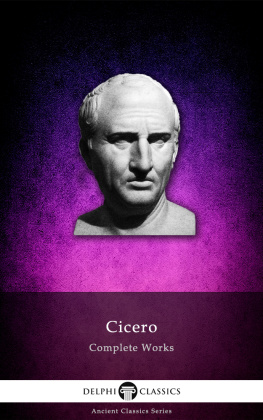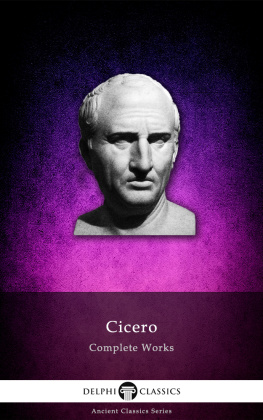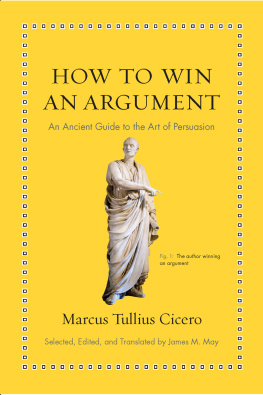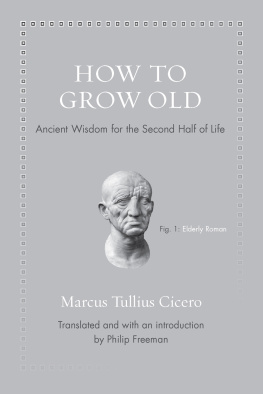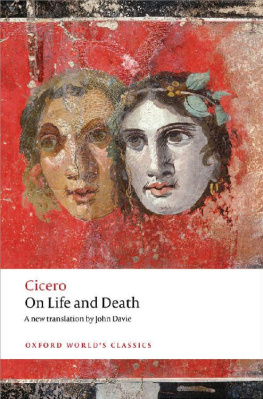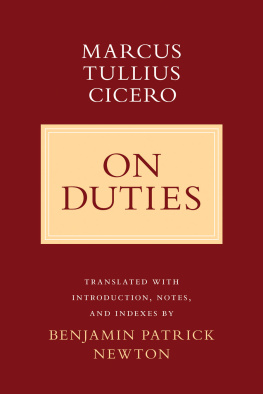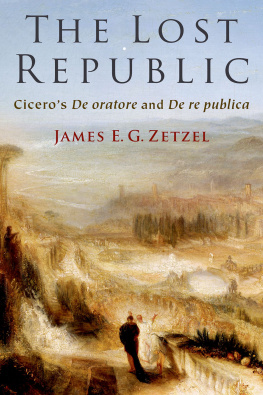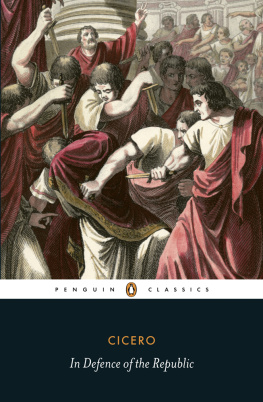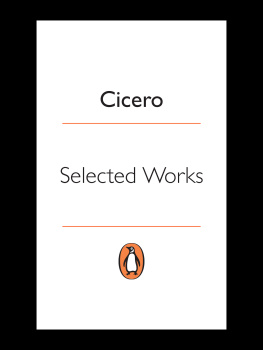APPENDIX 1
SOME OF THE ARGUMENTS USED IN For Balbus
The translation of For Balbus presented here concentrated on two points, the attitude of the Romans towards the enfranchisement of foreigners and Ciceros justifications for his own change of policy, in that he was now, in the interests of stable government, supporting a cause dear to the members of the autocratic First Triumvirate, which, in fact, he hated.
But the case also involved a number of rather intricate technicalities, which were omitted from the translation offered above but may be briefly mentioned at this point.
Cnaeus Pompeius Magnus (Pompey the Great) gave Roman citizenship to Balbus under the Lex Gellia Cornelia of the consuls Lucius Gellius Poplicola and Cnaeus Cornelius Lentulus Clodianus in 72 BC. The law empowered Pompeius to confer citizenship on individuals. Balbuss enemies based their objection to his enfranchisement on the Lex Papia of the tribune Gaius Papius (65), which was designed to stop the illegal exercise of citizen rights by expelling from Rome all foreigners who resided outside Italy (the political purpose of the law was to weaken Julius Caesar and his friends by driving from Rome their numerous foreign supporters).
These opponents of Balbus argued that, just as the people of Gades (Balbuss city) as a whole could not become Roman citizens unless a Roman law offering them this citizenship had been formally accepted by themselves, so, also, an express acceptance of the Lex Gellia Cornelia by the community of Gades (which had evidently not been received) was necessary to confirm the grant of citizenship to Balbus. That amounted to saying that the city to which a non-Roman belonged had a right to veto his acceptance of Roman citizenship. Cicero pointed out (a) that this was theoretically untenable and based on no precedent, since no member of an allied state (civitas foederata, which is what Gades was) had ever been prosecuted for his assumption of Roman citizenship, on the ground that his own state had not given its own consent, (b) that the people of Gades were, in fact, on Balbuss side, supporting the principle that it was legitimate for any individual among them to gain the citizenship of Rome.
Gades, as has been mentioned, was an allied community, bound to Rome by a treaty.
In the passages I have selected for translation, I have omitted certain conferments of citizenship which Cicero included. These are the following. Publius Caesius, knight of Ravenna, by Cnaeus Pompeius Strabo (father of Pompey, consul 89); Alexas of Heraclea in Lucania, by Publius Licinius Crassus (consul 97); Aristo of Massilia, and nine slaves of Gades, by Lucius Cornelius Sulla (dictator 81); Quintus Fabius of Saguntum, by Quintus Caecilius Metellus Pius (consul 80); Hasdrubal of Gades, and the Ovii (Mamertini) of Messana, and Fabii of Utica, and Saguntines, by Cnaeus Pompeius Magnus (Pompey).
APPENDIX 2
MINOR ORATORS MENTIONED IN THE Brutus
Cicero, in the interests of thoroughness, mentions the following additional orators, whose names have not been included in the translation.
Sections 7781. Older contemporaries of Marcus Porcius Cato the elder: Gaius Flaminius (consul 223, 217), Gaius Terentius Varro (consul 216), Quintus Fabius Maximus Verrucosus Cunctator (consul 233, etc.), Quintus Caecilius Metellus (consul 206), Publius Cornelius Lentulus Caudinus (praetor 203), Publius Licinius Crassus Dives (consul 205). Younger contemporaries: Gaius Sulpicius Galus (consul 166), Tiberius Sempronius Gracchus (consul 177, 163; richer style), Publius Cornelius Scipio Nasica Corculum (consul 162, 155), Lucius Cornelius Lentulus Lupus (consul 156), Quintus Fulvius Nobilior (consul 153), Titus Annius Luscus (consul 153), Lucius Aemilius Paullus Macedonicus (consul 182). Other contemporaries of Cato the elder: Aulus Postumius Albinus (consul 151), Servius Fulvius Flaccus (consul 135), Servius Fabius Pictor, Quintus Fabius Labeo (consul 183).
Sections 94f. Reckoned as orators of moderate ability: Lucius Mummius Achaicus (consul 146; simple and archaic), Spurius Mummius (his brother), Gaius and Lucius Aurelius Orestes, Publius Popillius Laenas (consul 132), Gaius Popillius Laenas (his son).
Sections 96f. Quintus Pompeius (consul 141; the first of his family to attain the consulship), Lucius Cassius Longinus (consul 127; not eloquent but influential; his ballot law was opposed, at first, by Marcus Antius Briso), Cnaeus Servilius Caepio (consul 169), Quintus Servilius Caepio (consul 140).
Sections 108f. Publius Cornelius Lentulus (consul 162; leader of the Senate), Lucius Furius Philus (consul 136; scholarly, and good Latin), Publius Mucius Scaevola (consul 133; knew law and politics well, and argued acutely), Manius Manilius (consul 149), Appius Claudius Pulcher (consul 143), Marcus Fulvius Flaccus (consul 125), Gaius Porcius Cato (consul 114), Publius Decius (tribune 121; turbulent in life and speech), Titus Quinctius Flamininus (consul 123; painstaking).
Section 135. Quintus Caecilius Metellus Numidicus (consul 109; dignified), Marcus Junius Silanus (ditto), Marcus Aurelius Scaurus (consul 108; pure diction), Aulus Postumius Albinus (consul 99; ditto), Postumius Albinus (priest; his brother), Quintus Servilius Caepio (consul 106; ruined by popular odium), Gaius Memmius (tribune III; mediocre orator but fierce prosecutor), Lucius Memmius (his brother), Spurius Thorius (tribune c. 118, modified the Lex Sempronia agraria of Tiberius Sempronius Gracchus), Marcus Claudius Marcellus (fought the Teutones 102), Publius Cornelius Lentulus Marcellinus (his son).
Sections 162f. Allied and Latin orators: Quintus Vettius Vettianus, Marsian (known personally to Cicero), Quintus and Decimus Valerius of Sora (literary), Gaius Rusticelius of Bononia, Titus Betutius Barrus of Asculum (the most eloquent; e.g. speech against Quintus Servilius Caepio, quaestor c. 100, grandfather of Marcus Brutus). Earlier: Lucius Papirius of Fregellae was considered the best.
Sections 175f. Decimus Junius Brutus (consul 77), Lucius Cornelius Scipio Asiaticus (consul 83), Cnaeus Pompeius Strabo (consul 89; father of Pompey), Sextus Pompeius (his learned brother), Marcus Junius Brutus (lawyer), Gaius Billienus (self-made, very distinguished), Cnaeus Octavius (consul 87).
Sections 178ff. Quintus Lucretius Vespillo (good at private suits in Sullan period), Quintus Lucretius Ofella (better at public speeches), Titus Annius (of Velina tribe), Titus Juventius (slow and cold but clever), Publius Orbius (praetor in Asia 63), Titus Aufidius (ditto 70), Marcus Vergilius (tribune 87; his brother), Publius Magius (his colleague; more voluble).
Section 182. Somewhat younger than Gaius Julius Caesar Strabo Vopiscus: Gaius Aurelius Cotta and Publius Sulpicius and Gaius Scribonius Curio (all discussed later), Quintus Varius Hybrida (tribune 91), Cnaeus Pomponius (tribune 90), Lucius Fufius, Marcus Livius Drusus (tribune 91; Marcus Brutuss great-uncle), Publius Antistius (discussed later).
Sections 222f. Inferior to the best: Lucius Fufius (see foregoing: good prosecution of Manius Aquilius, consul 101), Marcus Livius Drusus (see foregoing), Lucius Licinius Lucullus (see For Murena), Marcus Junius Brutus (tribune 83; Marcus Brutuss father), Marcus Licinius Lucullus, Marcus Octavius (who arranged the abolition of Gaius Gracchuss cornlaw; not the man of the same name who opposed Tiberius Gracchus), Cnaeus Octavius (consul 76; not the consul of 87), Marcus Porcius Cato (father of Cato the younger), Quintus Lutatius Catulus the younger (consul 78), Quintus Servilius Caepio (grandfather of Marcus Brutus, who left the Senate to become a knight), Cnaeus Papirius Carbo (consul 85, 84), Marcus Marius Gratidianus (praetor 85), Lucius Quinctius (tribune 74), Marcus Lollius Palicanus (tribune 71).


